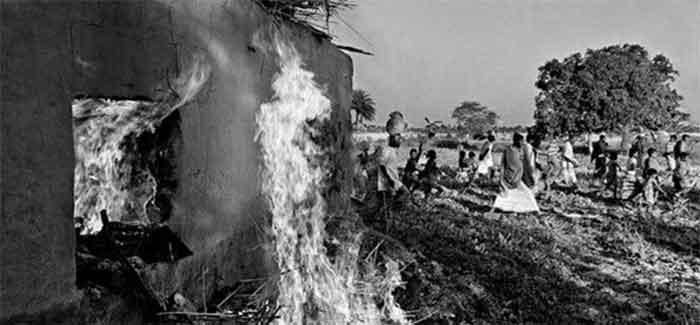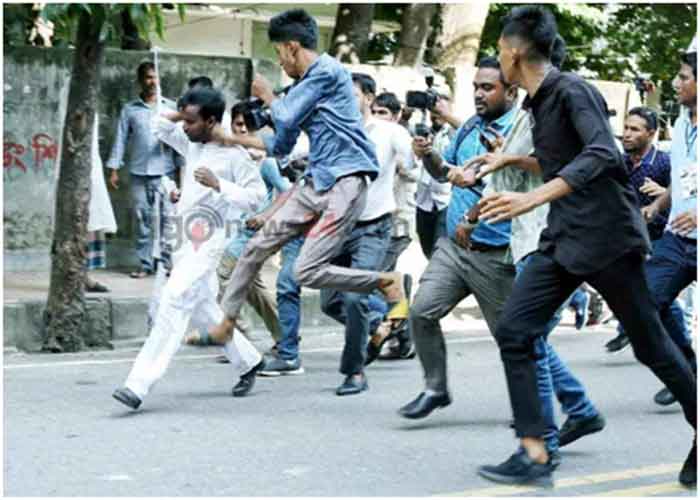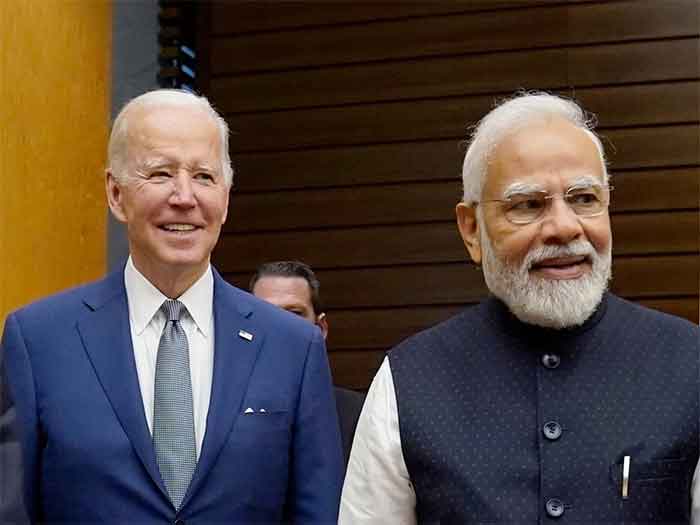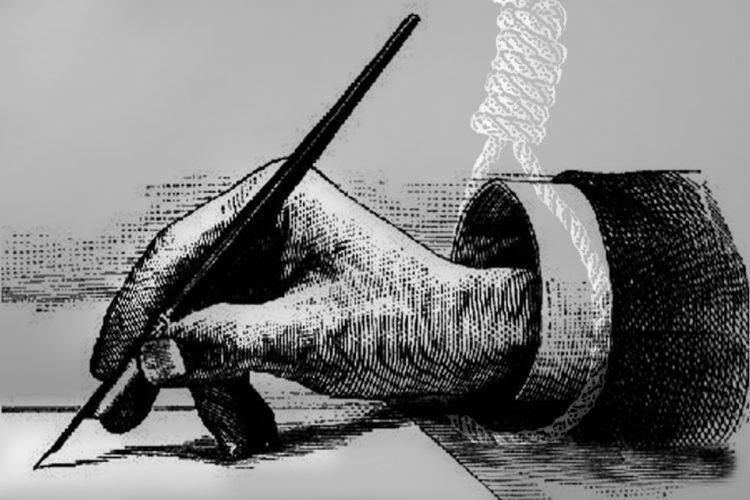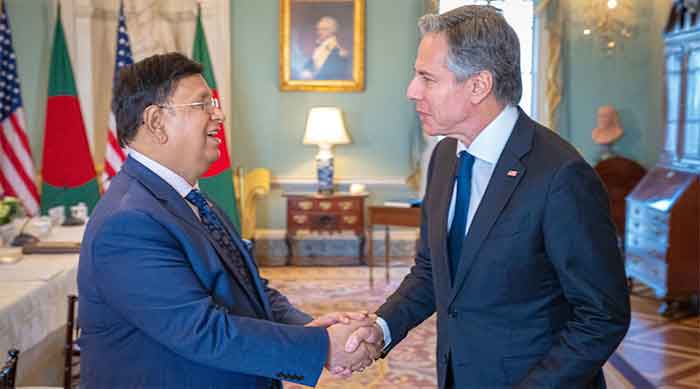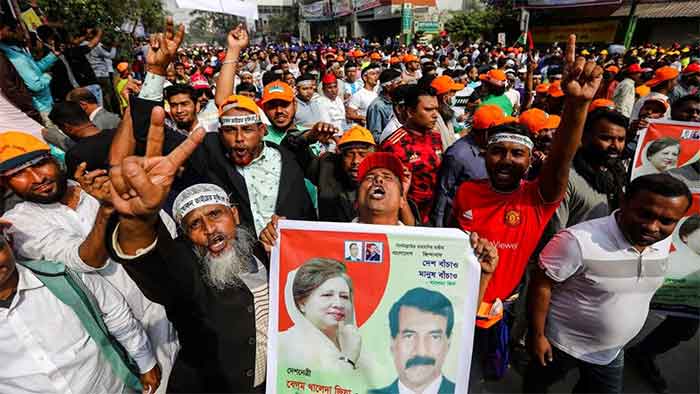
The BNP’s campaign has nothing to do with restoring democracy, nor is it driven by concerns about the deepening social crisis facing the Bangladeshi masses. The right-wing BNP is attempting to take advantage of the mass discontent against the Hasina administration, which has been in power for three consecutive terms since 2009.
But the BNP is determined to keep popular anger within the country’s parliamentary framework. When it was in power the BNP brutally repressed the opposition parties and the struggles of workers and the poor.
The BNP-led 20-party alliance, which includes the Islamic fundamentalist Jamaat-e-Islami and several other Islamist groups, has held 10 rallies, starting on October 12 in Chittagong, over the past two months.
Along with calls for the resignation of the Hasina government and for early elections, last Saturday’s rally in Dhaka issued eight other demands. These included the release of BNP chairperson Begum Khaleda Zia, who was jailed in 2018 for 17 years on corruption charges. The BNP alliance also announced that it would hold nationwide protests on December 24.
According to media reports, some 32,000 police mobilised in Dhaka to crack down on last weekend’s rally. The Awami League had previously warned the BNP not to hold mass protests in Dhaka on December 24 because it was holding its national council in the city on the same day.
Earlier BNP-led protests were violently attacked by police, aided by ruling party thugs. Seven BNP protesters have been killed by police and thousands injured so far.
Thousands more have been detained, including BNP secretary Mirza Fakhrul Islam Alamgir, who has been charged with “provoking party members to launch an attack on police” during a December 7 protest in Nayapaltan, Dhaka. Police raided the BNP’s central office on the same day.
The Hasina regime, which faces an escalating economic crisis, is acutely nervous about the rising mass opposition. Reflecting these concerns, a December 8 editorial in the Daily Star warned, “What could it [the ruling establishment] possibly gain from a heavy-handed confrontation and raid on the central office of the BNP?”
Running parallel with the BNP’s campaign, various Stalinist and “left” organisations have staged anti-government protests. The Left Democratic Alliance—which includes six pro-capitalist parties, including the Stalinist Bangladesh Communist Party (CPB), Socialist Party and Revolutionary Communist League—held a national protest on December 13 over government repression.
Echoing the BNP’s demands, CPB general secretary Ruhin Hossain Prince has declared that the only alternative to the current political crisis is to hold the next general elections under a neutral interim government.
The CPB and its allied trade unions, such as the Garment Workers’ Trade Union Centre, have repeatedly betrayed workers struggles. In 2020, when Bangladeshi apparel factories shut down due to the COVID-19 pandemic, Chowdhury agreed with employer demands that workers’ wages be cut by 35 percent.
In late November, Workers Party president Rashed Khan Menon appealed to various political parties to take joint action against the government. The Workers Party, which is another Stalinist formation and a member of Hasina’s ruling alliance, is desperately attempting to hoodwink its supporters by distancing itself from the government’s repressive actions.
All these Stalinist parties have a long record of aligning themselves with both of the country’s main bourgeois parties. In 1983, the CPB joined the Awami League-led 15-party alliance against the military rule of Hussain Muhammad Ershad. In 2006 it supported the BNP and since 2008 it has been part of Hasina’s grand electoral alliance.
The sordid political manoeuvres of the BNP, the Stalinists and other bourgeois parties, reflect their concerns about the deep-seated mass anger of working people over rising inflation, job cuts and government moves to privatise state-owned enterprises.
In the last six months, the prices of more than 50 essential medicines have increased. In early August, the government announced a more than 40 percent increase in fuel prices—the highest rises in Bangladeshi history—which immediately triggered nationwide protests of workers and the poor.
In November, the price of loose flour increased by 4 percent to 60–63 taka per kilogram. This month the average bulk electricity price will be increased by 20 percent, even as consumers suffer from daily power cuts. Bangladesh imports almost 77 percent of its total oil and refined fuels.
Anger is brewing, particularly among the country’s four million garment workers, who have suffered hundreds of thousands job losses, wage cuts and unpaid salary arrears during the pandemic.
On October 10, Janoron Sweater workers in Ashulia demonstrated to demand outstanding wages. On November 2, Olio Apparel’s workers protested due to four-month’s unpaid wages. On December 13, workers at the New Line Clothing Company in Gazipur took action for between three and five months of unpaid wages.
Farmers have also held demonstrations in Jamalpur, Rangpur and several other districts, to demand an uninterrupted supply of fertilisers.
Since coming to power in 2009, Hasina’s Awami League-led regime has ruthlessly mobilised the police and the notorious Rapid Action Battalion to repress all opposition from workers and the poor.
In January 2019, police shot dead a garment employee and injured scores when thousands of garment workers struck to demand a wage rise. Under bogus claims of fighting drugs in 2018, Bangladeshi police have conducted a systemic campaign against the population killing over 100 people and arresting about 12,000.
Like every other country, the deepening economic crisis in Bangladesh is a direct result of the US-NATO proxy war in Ukraine and the impact of the ongoing COVID-19 pandemic.
After having recorded several years of increased foreign currency reserves, Bangladesh’s current reserves have dropped to $US34.47 billion. At the end of June this year its foreign debt soared to $94.5 billion. In August, inflation surged to a 10-year high of 9.52 percent and continues to rise.
According to the International Monetary Fund’s October global outlook report, Bangladesh’s GDP growth forecast for fiscal year 2022–23 will decline to 6 percent, down from the government’s target of 7.5 percent. The Hasina government is currently attempting to secure a $4.5 billion IMF bailout package, the third country in South Asia behind Pakistan and Sri Lanka to seek help this year.
The World Bank reported in October that “revenues from self-employment [in Bangladesh], as well as median earnings for salaried and wage workers, still have not bounced back to levels commonly reported before the pandemic.”
Even though the BNP is attempting to seize upon the growing mass discontent, this right-wing bourgeois party, which has deep connections to the military, was deeply hated for its repressive rule. In the December 2008 general elections, it was routed with its number of parliamentary seats reduced from 300 to 29.
The BNP and the Awami League are pro-imperialist big business parties. They depend on the political support of the Bangladesh Stalinists, pseudo-left organisations and unions to maintain capitalist rule and impose the burden of the capitalist crisis on the working class and the poor.
The only alternative for the Bangladeshi working class is to rally the rural and urban poor independently of all these formations in the fight for a workers government. This must be part of the struggle for socialism in South Asia and internationally.
We urge workers and young people in Bangladesh to join the struggle to build a Trotskyist party as a section of the International Committee of the Fourth International to take forward the fight for this alternative socialist perspective.
Originally published in WSWS.org

